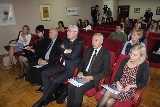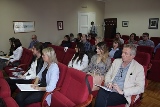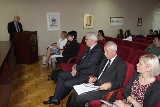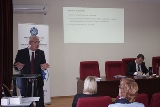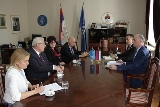Banja Luka: Seminar “Technology Transfer and Impact of Intellectual Property Rights to National Economy"
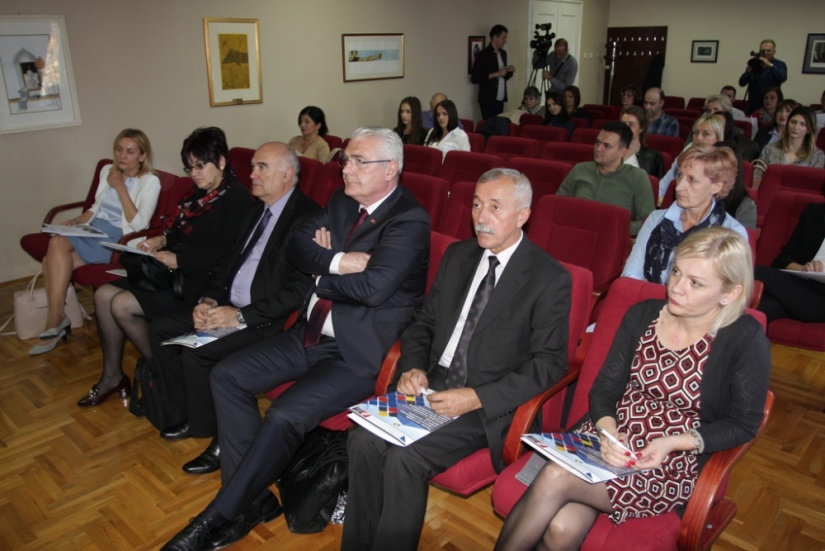
Banja Luka, October 30, 2018 - Seminar entitled “Technology Transfer and Impact of Intellectual Property Rights to National Economy" was held on October 30, 2018 at the premises of the Rectorate of the University of Banja Luka (UNIBL).
The organizer of this seminar was the Entrepreneurship and Technology Transfer Center of the University of Banja Luka, in cooperation with the Institute for Intellectual Property of Bosnia and Herzegovina and the European Patent Office (EPO).
Introductory speeches were held by Josip Merdžo, director of the Institute for Intellectual Property of Bosnia and Herzegovina, representatives of the Entrepreneurship and Technology Transfer Center and vice-president of EPO Željko Topić, who also held a lecture within the first theme of the seminar titled "EPO and European Patent System”. The seminar was attended by Prof. Dr. Strain Posavljak, vice-rector for teaching and student affairs at UNIBL.
Predrag Govedarica, project manager in Entrepreneurship and Technology Transfer Center at the University of Banja Luka, said that the goal of the seminar was to resolve any concerns about the protection of intellectual property and rights.
Govedarica stated that it is necessary to offer answers to questions on how to protect the work of authors and intellectual property, which creates a problem when the commercialization of the work takes place.
Josip Merdžo, director of the Institute for Intellectual Property of BiH, said there are very few projects of scientific-research institutions to protect the invention, which should be encouraged, as about 30 percent of world revenue comes from this area.
At the seminar on transfer of technology and the impact of intellectual property rights on national economy, Merdžo emphasized that the protection of this property should not be neglected, but should be raised to a higher level.
"We need to follow the world practice where five to seven percent of patents and innovations come from scientific institutions and scientific-research institutions, while in BiH applications for intellectual property protection are mostly filed by private entrepreneurs or individuals who, through patenting and innovation, protect their invention," Merdžo said.
He added that the issue of intellectual property protection is very extensive - from patenting to trade secrets, where sometimes not all elements of the invention have to be disclosed, but certain profit is gained through trade secret.
"In addition to the patents as the most general and best known feature of intellectual property protection, there is a trademark, copyright, industrial design and in all these segments the Institute has the capacity to assist everyone who appears to protect the segment of intellectual property because it has qualified personnel and knows how to do that,” Merdžo said.
He added that BiH has a good legal framework for the protection of intellectual property, but when it comes to that, there is also a problem of how to do it.
Željko Topić, vice-president of EPO, said that each new patent for which the application was submitted is compared with what is publicly available in any way, which is a very difficult and extensive job.
Topić said that this organization has 7,000 employees, of whom more than 4,500 scientists and engineers from different professions are conducting search of the state of the art and determine the patentability in each application.
Snježana Stanojević from the Institute for Intellectual Property of Bosnia and Herzegovina held a lecture on the subject "Role of universities in intellectual property system and ways to regulate intellectual property rights".
Irena Jakimovska, EPO administrator, held a lecture on the impact of intellectual property rights on the EU economy and on the transfer of rights, followed by discussion and closing of the seminar.
Josip Merdžo, director of the Institute for Intellectual Property of BiH and Željko Topić, vice-president of the European Patent Office based in Munich, met on the same day with Prof. Dr. Radoslav Gajanin, rector of the University of Banja Luka.
The meeting was about future cooperation in this area, UNIBL announced.

